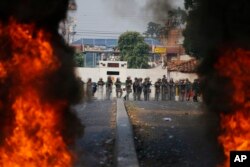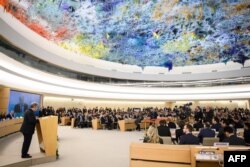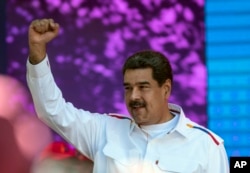The Trump administration stands with the U.S.-recognized interim president of Venezuela, Juan Guaido, "100 percent," Vice President Mike Pence said Monday as he announced new financial assistance for the Venezuelan people.
"We stand with you, and along with all the nations gathered here today, we will keep standing with you until democracy and liberty are restored," Pence said in a speech delivered to the Lima Group, following a trilateral meeting in Bogota, Colombia, with Guaido and Colombian President Ivan Duque. Pence said disputed Venezuelan President Nicolas Maduro "must go."
While in Bogota, Pence and regional leaders discussed strategy to hasten the departure of Maduro and how to get humanitarian aid currently piling up on the border in Brazil and Colombia into Venezuela, where supplies of food and medicine have run low.
Pence also announced additional sanctions on Maduro regime officials Monday, including three border state governors implicated in violence over the weekend and a member of Maduro's "inner circle."
”These men worked to block aid for people in need and suppress peaceful protests while their tyrant danced in Caracas. Their actions will not go unpunished," he said.
"In the days ahead as well, the United States will announce even stronger sanctions on the regime's corrupt financial networks. We will work with all of you to find every last dollar that they've stolen and work to return it to the Venezuelan people," Pence added.
Pence also announced that "the United States will provide an additional $56 million to support our partners in the region as they come to the aid of the Venezuelan people."
The Lima Group meeting was held after a weekend of unrest and violence on the Venezuelan borders with Colombia and Brazil, where Maduro's troops and loyalists have blocked the delivery of food and medical supplies. Maduro insists the aid is a pretext for an armed U.S. invasion.
"Maduro's loyalists turned on their own people. As the world watched, they set fire to trucks loaded with food and medicine desperately needed by the Venezuelan people," Pence said in his speech.
Use of force
Guaido has called on the international community to consider "all options" to resolve Venezuela's crisis. His rhetoric is similar to President Donald Trump's, who has said "all options are always on the table."
"All political and diplomatic resources have been exhausted. Now, what can we do as a region in order to support Venezuela?" he said in remarks Monday.
"You can choose to accept President Guaido's generous offer of amnesty, to live your life in peace with your families and countrymen. But if you choose the other path: continuing to support Maduro, you will ultimately be held accountable," Pence said Monday.
Guaido declared himself interim president in late January and is recognized by the U.S. and dozens of other countries as Venezuela's legitimate head of state.
Aid not getting through
None of the aid that's currently piling up in Colombia and Brazil has been able to get through Maduro's forces. At one border point, aid trucks caught fire, leading the crowd to rush to save the boxes of food and medical supplies.
A U.S. State Department official traveling with the American and Brazilian aid convoy told VOA that two trucks crossed the border into Venezuela on Saturday but were not allowed through the military checkpoint there and turned back to the Brazilian side.
U.N. condemns violence
On Sunday, United Nations Secretary-GeneralAntonio Guterres, and the head of the U.N. human rights office, Michelle Bachelet, called for violence to be "avoided at any cost and for lethal force not to be used in any circumstances."
On Saturday, Maduro supporters fired bullets at those attempting to get aid trucks into Venezuela, while Venezuelan border troops fired tear gas and rubber bullets.
Pence on Monday, referring to Maduro as the "tyrant in Caracas," said the violence over the weekend has "only steeled our resolve" to support Guaido.
According to the U.N., "The excessive use of force used by the Venezuelan security forces, as well as the involvement of pro-government elements," have resulted in at least four confirmed deaths and more than 300 injuries on Friday and Saturday.
Dany Bahar, a Venezuela expert at the Brookings Institution, said the next steps for the international community will be to find ways to increase pressure diplomatically and financially on the Maduro regime and "to try to get the United Nations on board, which has not happened yet."
Critics of the U.S.'s confrontational polices are concerned they will only exacerbate tensions in the region and make it more difficult to reach a peaceful resolution to the political standoff in the country.
"If they didn't intervene in the way they're doing now, there would be some kind of compromise that would emerge through negotiation. And they don't want that," said Mark Weisbrot, a Latin America analyst and co-director of the Center for Economic and Policy Research in Washington.
However, Trump administration supporters point out that the government security forces in Venezuela are responsible for the violent repression in the country and the killing of innocent civilians.
"One side has all the guns, and that's the regime of Nicolas Maduro," said Roger Noriega, who was an assistant secretary of state for Latin America during the administration of President George W. Bush and is now a political analyst with the American Enterprise Institute.









